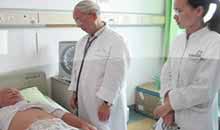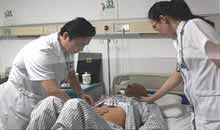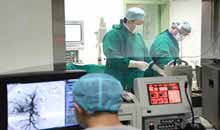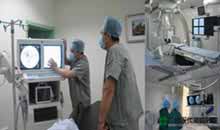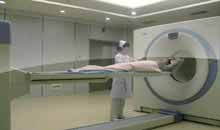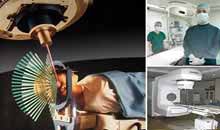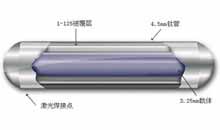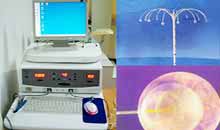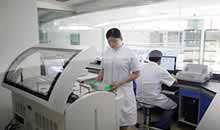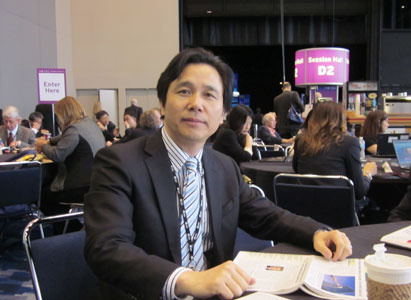
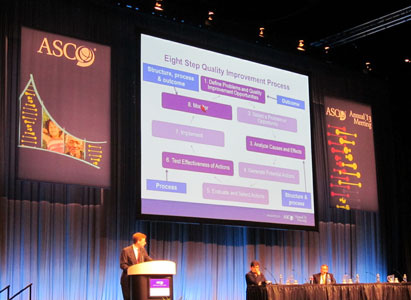
In the 2013 ASCO Annual Meeting, scholars from large cancer research institutions of China showed extraordinary talents. As the leader of Chinese cancer hospitals, Modern Cancer Hospital Guangzhou also was invited to attend this meeting and assigned Peng Xiaochi, Director of Oncology Department of Modern Cancer Hospital Guangzhou as representative. Prof. Peng believed that every academic exchange will trigger a brainstorm. Mild or significant, it will lead to a transformation of the cancer academic world. What are the hot spots of this annual meeting? We have invited Prof. Peng for an interview, in which he gave us a professional and detailed analysis to this meeting.
This theme of this ASCO annual meeting is “Build a bridge to conquer cancer”. How should we comprehend this phrase?
Prof. Peng: ASCO Annual Meeting gathers more than 30,000 doctors and researchers from over 100 countries. It calls everyone together to spread the newest and most outstanding clinical achievements as well as fundamental research of cancer treatment in the world through this meeting. Thus, doctors from all over the world can apply and borrow these achievements, which will ultimately help worldwide patients resist cancer successfully. Therefore, this theme indicates medical knowledge can be spread and that the gaps between countries and countries can be narrowed. Thanks to the ASCO annual meeting, the spreading is now faster and more extensive than ever.
Where do the hot spots of the 2013 Annual Meeting focus?
Prof. Peng: The hot spots of this annual meeting focus on targeted therapy, natural therapy and genetic testing technology. In the past 50 years, the research on medicine production had been focusing on medicines with aggressive cytotoxicity, which caused many side effects to human body. In recent years, cancer doctors are focusing on molecular targeted drugs. This year is no exception. Immunotherapy was not approved in the past years but now has also become a hot spot. With the development of cytobiology, natural therapy has become a main treatment method from assistant treatment and drew more and more attention from the public.
With the continuous development of global oncology, molecular cancer diagnosis, molecular cancer gene typing, individualized tumor therapy, multidisciplinary treatment, etc., all these various new terms have become the keywords of ASCO annual meeting. What is your view point on these keywords?
Prof. Peng: these keywords are the results of medical scientists’ continuous exploration and try. They indicate the progress of cancer research and treatment. Take “individualized tumor treatment” as an example, every patient’s pathological feature, individual character and cause of cancer are different, so we should apply different treatment to them correspondingly. Due to technology constrain, cancer patients used to be performed the same therapy in the past. Nowadays, individualized treatment is given to cancer patients basing on their different individual body condition. It can be surgery or other else.
Cancer doctors are paying more attention on patient’s nursing care and life quality, and oppose overtreatment which causes extra painfulness to patients. Is there any discussion on this aspect in the meeting? What is your view point upon it?
Prof. Peng: There are indeed a great deal of discussions on nursing care and palliative treatment in the meeting. Although cancer research is progressing, we have to admit that there is still part of advanced cancer patients who lose cure possibility due to failure of taking treatment timely. Even the cancer cells in their body can be killed completely with medical technology, their body may not be able to endure. Considering patients’ toleration, we must give them proper nursing and treatment, so as to avoid deterioration.
What is the research achievement that made the deepest impression on you in the meeting?
Prof. Peng: The research on colorectal cancer targeted treatment has draw wide attention from the public. Targeted therapy has always targeted breast cancer in the past, but it is extended to colorectal cancer this year. Drugs targeting the colorectal cancer cells and focus on the origin of cancer, which refers to gene or mitochondrion here, is more precise and of less side effect than traditional colorectal cancer chemotherapy drugs.
As a famous international cancer-specialized hospital, Modern Cancer Hospital Guangzhou is invited to attend the ASCO annual meeting and won approval from the international cancer world. What do you think are the reasons for such approval?
Prof. Peng: The reason for the approval of international cancer world towards Modern Cancer Hospital Guangzhou mainly includes three special characteristics of our cancer treatment:
1. Comprehensive treatment
2. Minimally invasive treatment
3. Chinese medicine treatment
As I have introduced before, comprehensive treatment combines many therapies together, making the treatment more three-dimensional. Minimally invasive treatment also has become a trend of ASCO annual meeting’s research highlights. Its continuous research achievements start to prove its accuracy and effectiveness. Modern Cancer Hospital Guangzhou is acting a significant leading role in minimally invasive cancer treatment. As for Chinese medicine treatment, it is the characteristics of Chinese hospitals. Dialectical Chinese medicine makes up the insufficiency of Western treatments and covers the fields where Western treatment cannot reach.
What inspiration does the 2013 ASCO Annual Meeting bring to the cancer research of Modern Cancer Hospital Guangzhou and China?
China has a very large population, which contains a great number of cancer clinical cases. China’s cancer researches pay more attention to clinical cases. We need to make more effort in combining fundamental science with clinical research.
Reviewing the research achievements in the ASCO annual meeting, do you think we can really conquer cancer?
Prof. Peng: The answer is in the affirmative. We should hold such hope. Many complicated diseases in the history have been overcome one by one. One step on the progress of cancer research every year is one step closer to our success of conquering cancer.
With the increasingly worsening of environmental pollution and heavy mental stress, the worldwide cancer incidence is rising every year. Although our way of defeating cancer is difficult, we still have to keep on pacing ahead. ASCO annual meeting and other similar platforms enable international cancer specialists to realize common progress through smoother exchanging and more frequent sharing. The continuous breakthrough of cancer treatment will ultimately benefit cancer patients. Therefore, cancer patients must hold the belief that the success of conquering cancer will come one day and fight for a longer life.
If you have any questions, please contact us via online consultation, email or phone call. If you find our website useful, please follow our FaceBook and YouTube, health information will be updated regularly.




